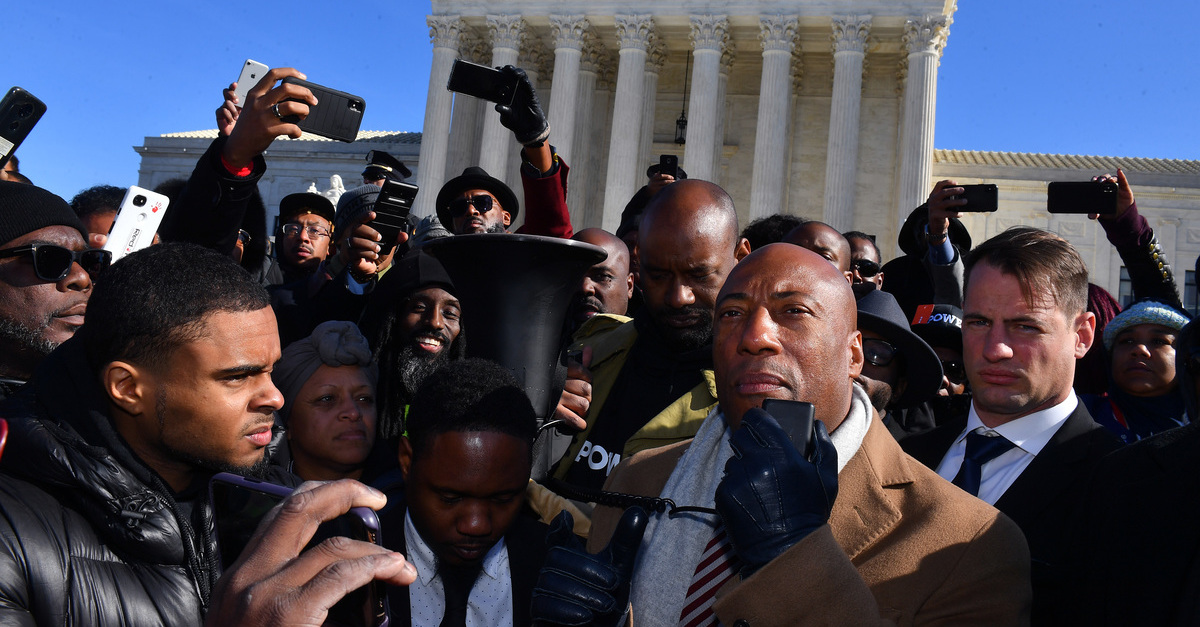
Byron Allen, Founder/Chairman/CEO, Entertainment Studios, appears at the Supreme Court of the United States for racial discrimination suit against Comcast on November 13, 2019 in Washington, D.C.
The Supreme Court of the United States handed a big win to Comcast Monday when it ruled to employ the “but-for” rule in Comcast Corp. v. National Association of African American-Owned Media, a case about racial discrimination in media.
Entertainment Studios Networks, Inc. (“ESN”) is an African American-owned media company that owns and operates television networks. For years, ESN had been trying to get onto Comcast’s distribution list, but Comcast consistently refused. ESN sued Comcast for violation of civil rights statutes, alleging that Comcast contracted with white-owned networks, but that its refusal to carry ESN’s channels amounted to illegal discrimination. Comcast had introduced evidence that other, non-discriminatory business reasons, contributed to its decision not to work with ESN.
The Ninth Circuit ruled in favor of ESN, overturning the district court’s dismissal of the case. On appeal to the Supreme Court, the issue was whether, at the initial pleading stage, racial discrimination needed to be the only reason Comcast refused to do business with ESN.
Comcast argued that at all stages of the case, a “but-for” test is appropriate. Such a standard would mean that to prevail on a claim, racial discrimination needs to be the deciding reason that Comcast chose not to contract with ESN. By contrast, ESN argues that if racial discrimination was one among several factors influencing Comcast’s decision, it has a valid discrimination claim.
Justice Neil Gorsuch, writing for the court, held that everything about §1981 points to the “but-for” rule being the correct one to apply, both during the pleading stage and during trial:
All the traditional tools of statutory interpretation persuade us that §1981 follows the usual rules, not any exception. To prevail, a plaintiff must initially plead and ultimately prove that, but for race, it would not have suffered the loss of a legally protected right. We do not, however, pass on whether ESN’s operative amended complaint “contain[s] sufficient factual matter, accepted as true, to ‘state a claim to relief that is plausible on its face’ ” under the but for causation standard. Iqbal, 556 U. S., at 678–679.
Noting that the Ninth Circuit had “assessed ESN’s pleadings under a different and mistaken test,” the Supreme court remanded the case back to the district court to put its ruling into action.
Justice Ruth Bader Ginsburg concurred in the unanimous ruling, but made sure to point out that while she acknowledges the court’s technical correctness on the matter, she didn’t exactly love the rule. In a footnote, Ginsburg remarked:
*I have previously explained that a strict but-for causation standard is ill suited to discrimination cases and inconsistent with tort principles…
I recognize, however, that our precedent now establishes this form of causation as a “default rul[e]” in the present context.
Later in her concurrence, RBG explained the injustice she saw with employing a strict “but-for” rule in civil rights cases:
a lender would not violate §1981 by requiring prospective borrowers to provide one reference letter if they are white and five if they are black. Nor would an employer violate §1981 by reimbursing expenses for white interviewees but requiring black applicants to pay their own way. The employer could even “refus[e] to consider applications” from black applicants at all.
“That view,” Ginsburg said about using the but-for rule with §1981, “cannot be squared with the statute.” A law that was meant to secure freedoms, Ginsburg continued, could not plausibly “condone discriminatory barriers to contract formation.”
The case is now remanded back to trial court for further proceedings consistent with the SCOTUS rulings. Although the court’s ruling theoretically gives ESN the chance to plead and prove allegations against Comcast, the likelihood is that we’ll see this case settle rather than proceed to trial.
[image via Larry French/Getty Images for Entertainment Studios]
Have a tip we should know? [email protected]